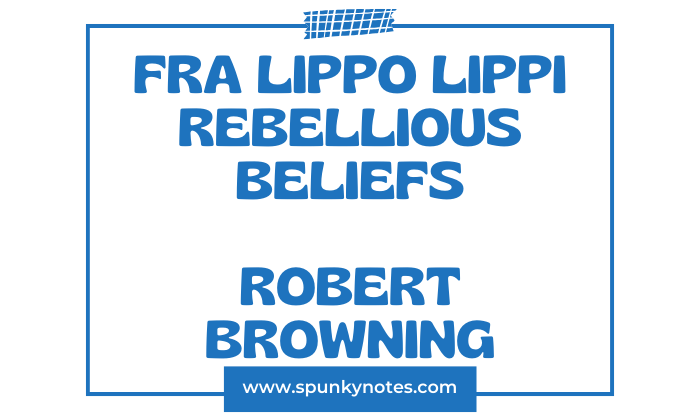
Q. How does Robert Browning’s Fra Lippo Lippi challenge traditional religious beliefs and expectations of the time?
Introduction
Robert Browning’s “Fra Lippo Lippi” is a dramatic monologue that shows the life and thoughts of the title character, a monk in Renaissance Florence.
The poem presents Fra Lippo Lippi during an unexpected encounter with the night watch after he is caught wandering the streets.
This event leads to a discussion on the intersections of art, religion, and society. Browning uses the character to question the norms of his time, particularly how art and religious duty intersect and influence each other.
Fra Lippo Lippi’s perspective is significant because it contrasts sharply with a monk’s expected behaviour and ideals.
He is depicted as a complex character who challenges the restrictive boundaries set by his religious role. His candid speech expresses a more human view of religious life.
It suggests that religious expression and artistic creativity are not mutually exclusive but can enrich each other.
Characterization of Fra Lippo Lippi
Robert Browning’s Fra Lippo Lippi features an unconventional and multifaceted monk. Unlike typical religious figures in literature, who are often idealized, Fra Lippo Lippi is shown as deeply human, with personal desires and flaws.
He openly admits to his sins and discusses his struggles with earthly temptations, reflecting his internal conflict between his monk duties and his inclinations.
This realistic portrayal challenges the traditional image of religious figures as faultless and detached from worldly desires.
Browning uses Fra Lippo Lippi’s character to highlight the tension between individual identity and institutional expectations. The monk’s candid reflections provide insight into his personality and highlight his critical view of the restrictive norms imposed by the religious institution he serves.
Through this character, Browning examines the question of personal freedom versus societal obligations, particularly within the stringent confines of monastic life.
Questioning the Value of Religious Art
In “Fra Lippo Lippi,” Robert Browning debates the purpose and value of religious art. The poem portrays the monk Fra Lippo Lippi defending his approach to religious painting against those who view his works merely as decorative.
He argues that his art does more than adorn church walls; it inspires and elevates the spirit of those who view it. This perspective challenges the prevailing notion that religious art should primarily depict biblical stories straightforwardly.
Fra Lippo Lippi suggests that art has the power to affect profound spiritual experiences and should not be confined to didactic purposes.
His defense highlights a conflict between artistic expression and the church’s practical approach to art, questioning whether true artistry can exist under such constraints.
Critique of Church Morality
In “Fra Lippo Lippi,” Robert Browning critiques the church’s moral standards through the character of the monk, Fra Lippo Lippi, who challenges the rigid and often unrealistic moral expectations imposed by the church.
He argues that these moral codes are too strict and do not account for the natural human tendencies towards error and weakness.
The monk’s perspective presents the church’s morality as disconnected from the realities of everyday life. It suggests that it sets people up for failure rather than guiding them towards moral improvement.
This critique defends his art, as he believes his work is more inspiringly spiritual and moral than the church’s stringent rules.
Role of the Church in Society
In “Fra Lippo Lippi,” Robert Browning explores the church’s role in society through the main character’s experiences. Fra Lippo Lippi is both a monk and an artist who questions how the church dictates what is right and controls personal expression.
He argues that the church’s tight grip on art and morality might limit personal creativity and growth. He defends his art, emphasizing its ability to inspire and stimulate thought, which contrasts with the church’s view of art as merely instructional.
Fra Lippo Lippi challenges the idea that the church should be the community’s only guide for moral and spiritual matters. He highlights that personal experiences and individual expressions are valuable alongside religious teachings.
Through this character, Browning encourages readers to consider the church’s influence on both public and private life, suggesting that a more diverse approach to spirituality and ethics could benefit society.
Conclusion
Robert Browning’s poem “Fra Lippo Lippi” challenges traditional religious beliefs and expectations by portraying a monk who questions the norms of his time.
Fra Lippo Lippi, the monk, argues that art can be spiritually meaningful and not just decorative or didactic as dictated by the church. He criticizes the church’s strict moral codes as unrealistic and suggests that religious figures, like himself, are human and flawed.
By presenting these views, the poem opens up discussions about the role of art in religion and the rigid moral expectations set by religious authorities.
Browning uses the character of Fra Lippo Lippi to encourage readers to think about the relationship between individual expression and traditional religious roles.

